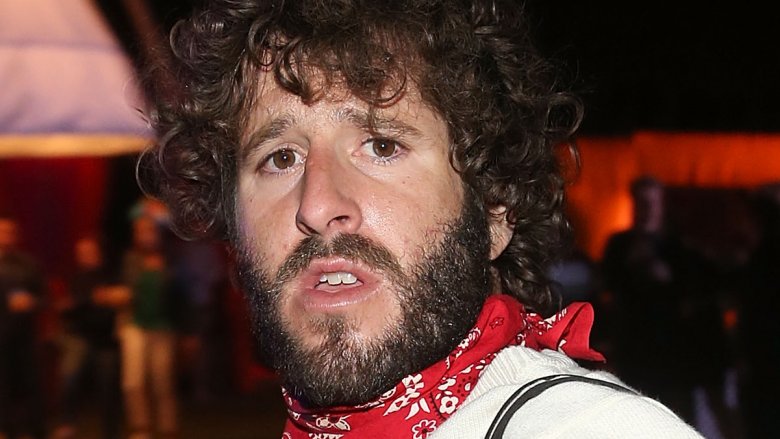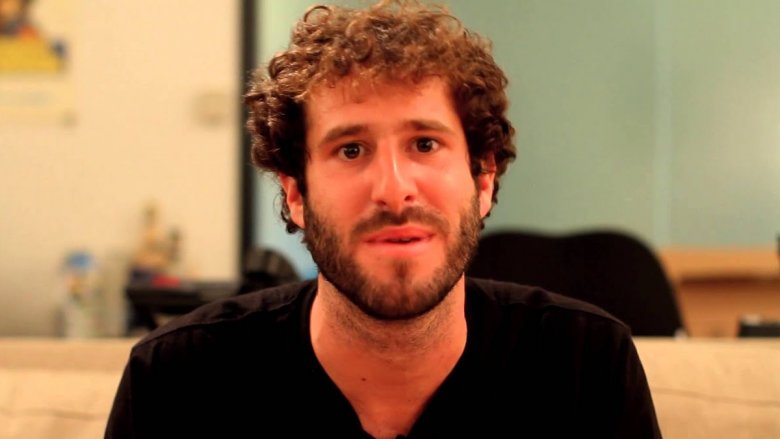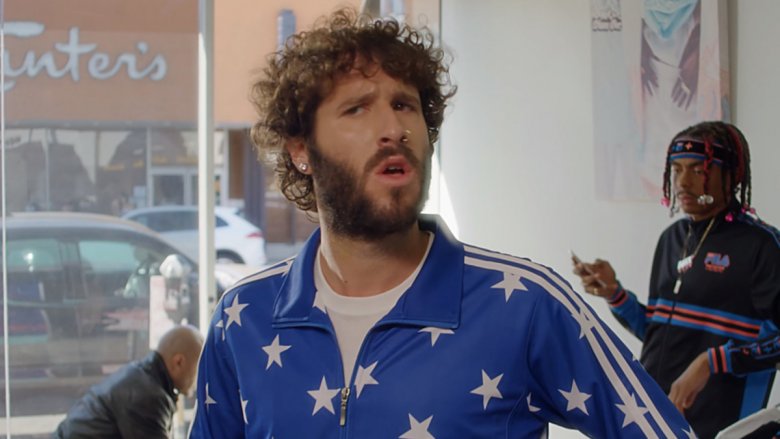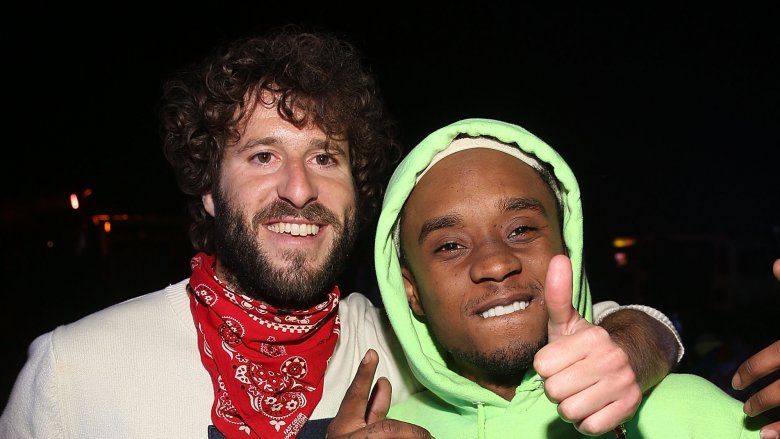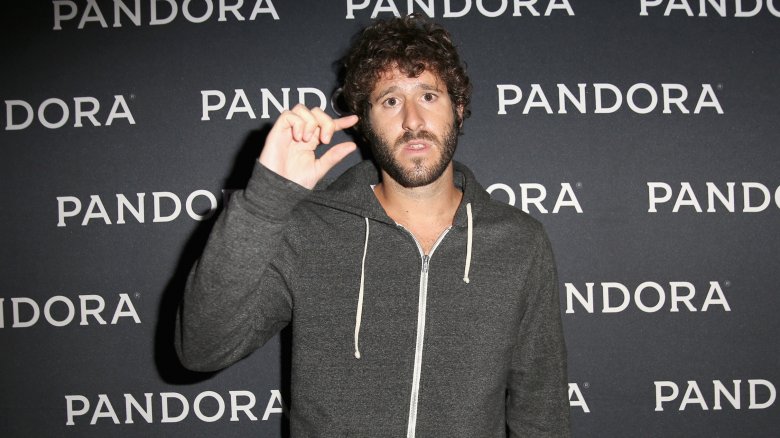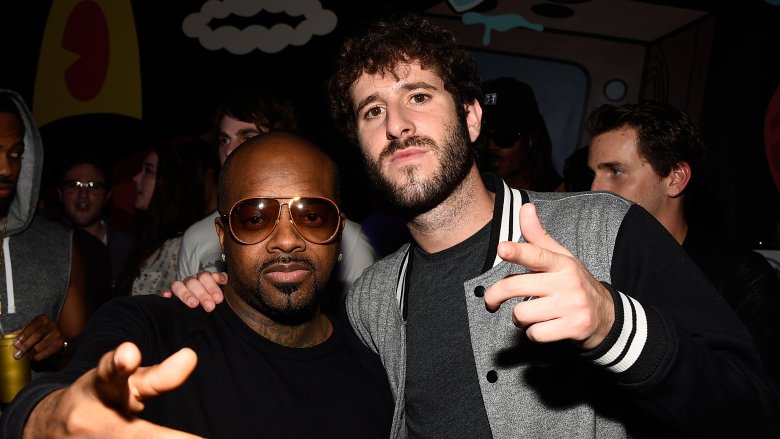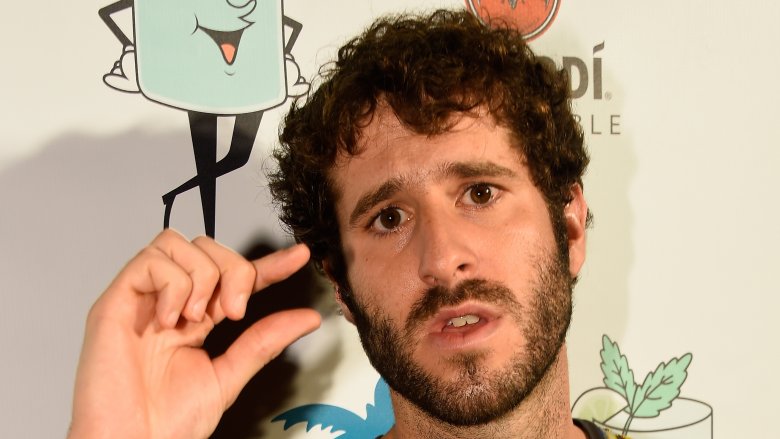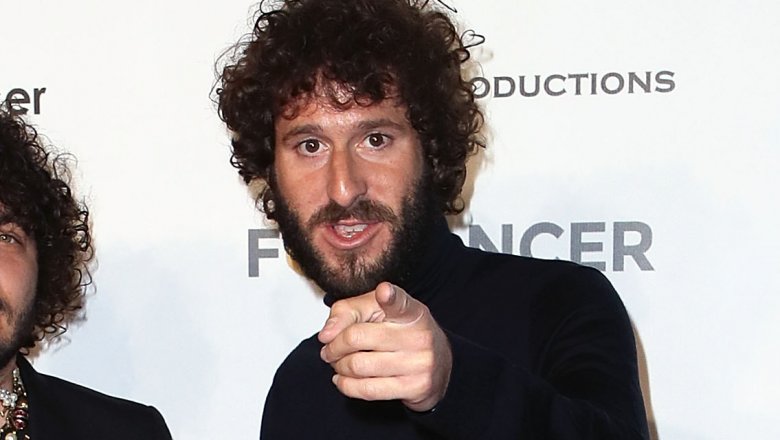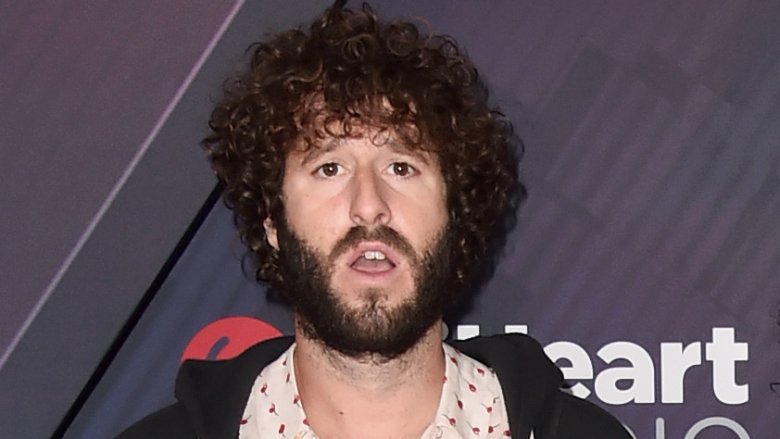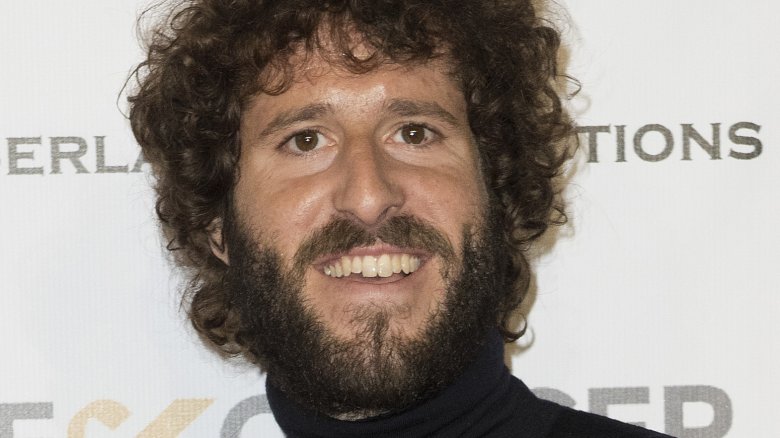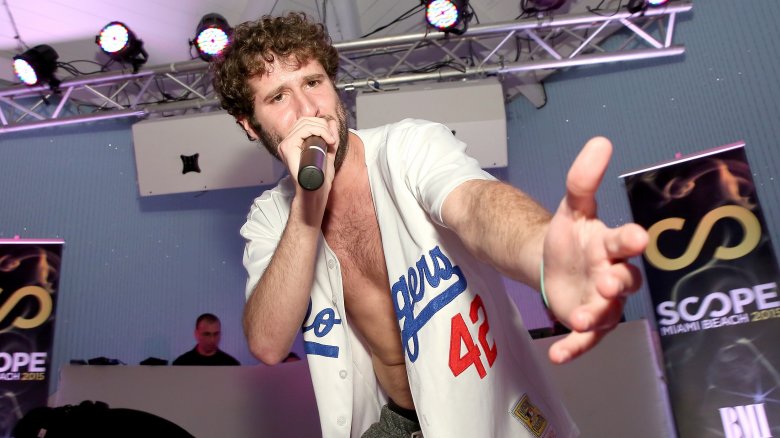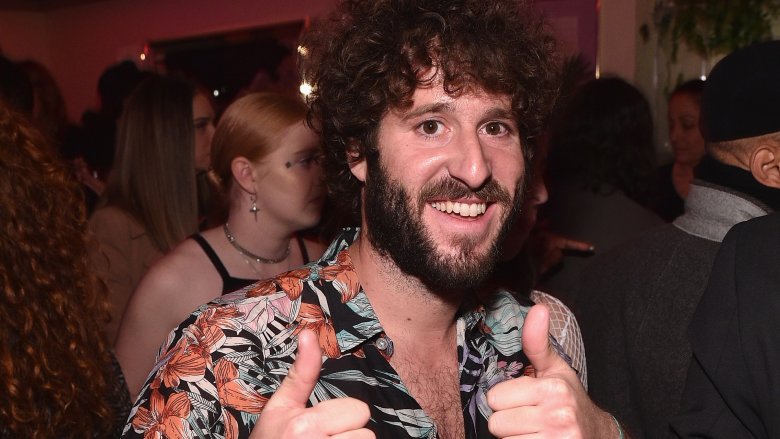The Untold Truth Of Lil Dicky
By now, pretty much everyone has heard of Lil Dicky. With several viral videos on YouTube and hits on the Billboard charts, he's been impossible to miss. But it wasn't all that long ago that Dave Burd, the man behind the Lil Dicky alias, was an account representative at an ad agency with mere dreams of super-stardom.
Now that he's broken out onto the music scene, the world is learning more about the Cheltenham, Penn. native. There's quite a lot of Burd's background information embedded in the song "Professional Rapper," the title track off his debut album. But what about the stories the general public has missed? How did Lil Dicky reach the level of fame he has in such a short period of time? What hardships has he faced, and what's next for him? From things that people should be talking about to things that the rapper doesn't want people to know, here's the untold truth of Lil Dicky.
The enormous Kickstarter campaign
When Burd posted his first music video to YouTube, "Ex-Boyfriend," he couldn't have anticipated the response from fans. The video went viral, earning more than one million views in less than 24 hours. Determined to ride the wave, the rapper continued posting videos, turning into somewhat of a YouTube sensation.
Yet, despite the low production costs of his videos, if Burd wanted to truly see how far he could take his rap career, he would need to fully invest himself. For that he would need capital. So Burd leaned on his loyal following for financial support in the form of a Kickstarter campaign.
In his campaign, which set a goal of $70,000, Burd stated, "I've got no money, and I really think I'm on to something. I want to create a phase two of this entire operation, which I think can be even bigger than the first phase." His plan worked. Fans raised $113,000, and Lil Dicky created his first full album, Professional Rapper, with the funds.
A less-than-stellar tour life
While Lil Dicky made going viral look easy, the live show and tour portion of his career have been another story. After his first concert in Philadelphia, the opening show of his first tour, Lil Dicky discovered just how challenging performing really is. In a review of the show in Philadelphia magazine, Joe Coufal wrote, "You could tell that he seemed to get a little gassed by the end of his set. The unbounded energy from the first couple songs seemed to be missing, and the crowd simmered a little with him." Even Burd acknowledged the difficulty, telling HipHopDX, "Immediately after I began rapping, I could tell how much more tiring this was going to be than simply rehearsing, or rapping in my room. So I was just thinking, 'Survive.'"
Though he learned to pace himself better over time, Burd doesn't exactly sound like he loves touring. When asked about it, Burd told Noisey that touring is "less eventful than you'd think." He added that while "other rappers ... have six friends with them," all his friends "have jobs they can't just get up and leave from." Perhaps that's one of the reasons why shortly before his "Life Lessons Tour" was set to begin Lil Dicky officially postponed the tour.
Rapping while you work
Before Lil Dicky became an online sensation, he got the courage to put his rapping talents to the test while working at the ad agency Goodby, Silverstein & Partners. Burd, who was employed in the account management department, was tasked with sending out monthly reports to everyone who worked on the Doritos account with him, as noted by The Guardian. "It was so boring, and nobody seemed to actually care," he said in an interview with The Hundreds. "So one time, I decided to deliver the report in the form of a rap song. Over Drake's 'best I ever had.' Everybody at my agency's mind was blown."
It was this stroke of genius that started Burd on his path to rap stardom. When the powers that be at Goodby, Silverstein & Partners needed someone to create an internal report for the people at Doritos, Burd got the call. "I then was tasked to make a music video for an internal Doritos meeting," he said, "which ended up showing me how easy and simple it is to make legit looking music videos." In addition to earning him a promotion to the creative department, the success of this first video helped Burd gain the confidence to create Lil Dicky.
He's heading to the small screen
Burd never hid the fact that his end goal has been comedy. He admitted that his early raps were purely an attempt to get noticed by TV and film producers. "I wanted to do something to get noticed for being funny," he told Maxim. "But I had no connections in that space. I wanted to do something for attention. I could always kind of rap pretty casually, so I thought about rapping as a manageable way in."
Well, that dream is finally coming true for Burd, as FX ordered a pilot episode of a show co-written by the rapper. According to The Hollywood Reporter, "The potential series revolves around a suburban neurotic man in his late 20s who has convinced himself that he's destined to be one of the best rappers of all time. Now he must convince the world."
Burd, who will also star in the pilot, described the show as "the story of my life" in an interview with Fuse. "Imagine Curb Your Enthusiasm where the protagonist is a 29-year-old rapper," he said.
How he really feels about hip hop
Lil Dicky may have gained overnight fame, but his music didn't impact everyone in the same way. His content has been challenged, and he's been slammed by a few critics. It doesn't help that Burd once stated in a now-deleted blog post (via Noisey) that rap is really only relatable if you are "an extremely stupid person that began life as a poor, violent man, only to see your fortunes turn once you started rapping."
Drew Millard of Noisey questioned Burd's claims that he has "as much right to swag" as rappers who "come from nothing," because he, too, has "overcome a lifestyle." Burd then stated, "It's very impressive when you go from nothing to something. But let's be realistic, sometimes people have nothing to lose and it's very easy to go for their dreams. I had a very safe route that would make me relatively content for the rest of my life. And I pretty much put that aside. I don't think that should be ignored in my opinion, I think that's a brave thing."
While he certainly took chances in his early rap adventures, Burd seems to value risk over opportunity. Sure, if he failed, his reputation would be damaged. But, as Millard stated, "Unlike a poor black person he had job prospects." To risk failure, Burd needed the opportunity to try, something many don't have.
The ad man
Lil Dicky's involvement in advertising began when he landed a job with Goodby, Silverstein & Partners right out of university. As a business major from the University of Richmond, who graduated summa cum laude, Burd showed a knack for the business world.
After moving from account manager to creative, Burd took on the copywriting for the NBA playoffs and its "Big" campaign. But his work in advertising didn't end when he left that position for the rap game. Since becoming a rapper, Lil Dicky has been in commercials for Trojan, Madden 19, Carl's Jr., and Hardees.
But Burd isn't stopping there. When speaking with Adweek, he name-dropped some other brands that he would like to work with. "I love Perrier. I don't know where they stand on advertising. But I'm happy to get in front of the camera and speak with complete confidence about how great Perrier is," he said. "There are probably so many more. I love the NBA. I love Nike. Nike is a great brand, obviously. But I also came from an advertising world, so I just enjoy the challenge of making a commercial."
Reddit went after him
While there's a gray area as to what's an acceptable level of influence one can and should have over their viralness online, Lil Dicky has been accused of going too far. At least, some on the Reddit community seem to think he did. According to the founder of r/HipHopHeads, the site's largest hip hop community, Lil Dicky was reportedly "caught doing vote manipulation for all his video releases." While Lil Dicky admitted that he asked some friends via text and Facebook to upvote, he claimed that he didn't know his actions were frowned upon.
Some believe that fake accounts were being created to flood Lil Dicky's content on Reddit, while others suggest that even the comments made on many of his videos were faked. The result was the banning of Lil Dicky and his content from r/HipHopHeads. However, the thread founder acknowledged that the rapper himself may not be behind the vote manipulation and suggested that others contributed.
But that's not the only story. It's possible that Lil Dicky's counterculture vibe and controversial comments about the genre of rap rubbed fans of the community the wrong way. After all, his great success while being, what some critics call, disrespectful to the genre was bound to ruffle some feathers along the way.
The true costs of his music videos
It's hard to say how much Burd's former advertising experience benefited his rap career, but it certainly didn't hurt. In his interview with Adweek, he reflected on his time with his old employer. "There were so many things that I saw," he said. "Every day they're just churning out videos, content, whether it's internal, client facing, sometimes external, and it was very eye-opening to see how easy it is to make s**t."
While Burd credits his old job for showing him how to make "legit looking videos," he also seems to have grasped the concept of a concept video, to put it awkwardly. It helps that his songs often carry a strong concept, but matching video to song requires creativity. Take "$ave Dat Money," for example. To make this video, Lil Dicky borrowed cars and houses for free. Now the rapper said he saved $30,000 this way, as noted by Billboard, but the video's concept is really what's important.
Plus, if Lil Dicky was really embodying the everyman rapper, he wouldn't have made the "Pillow Talking" video. This video cost $700,000 to create, making it the 49th most expensive video ever made, according to Consequence of Sound.
The best rapper alive?
Lil Dicky often portrays himself as the antithesis of the average rapper, a somewhat nerdy and awkward outsider in the genre. But, though he may look and sound like a guest in hip hop, he feels that he deserves all the recognition he's received. In fact, he might even think it's owed to him.
Plenty of rappers have egos that don't match their abilities or their resumes, but Lil Dicky's made some claims that would make hip hop legends blush. When Lil Dicky said he considered himself "the greatest rapper alive" (via HipHopDX), he had not yet released a full studio album. When he was named to the 2016 Freshman class for XXL, the rapper wasn't shocked. In fact, he said that he would have been "offended" had he not been named.
In speaking with HipHopDX about his first mixtape, Lil Dicky said, "I did So Hard to be noticed for being funny. And then towards the end of it I started to really evolve as a rapper and noticed how good I had become." Perhaps that led him to write a song like "Russell Westbrook on a Farm," a track that he calls "a masterpiece" (via HipHopDX). But not everyone is buying that claim. Music reviewer and YouTuber Anthony Fantano stated in his review of Professional Rapper that "the very notion that Lil Dicky is going to change the game with this music ... to advance that idea, it's just preposterous."
That one time at summer camp
Burd has offered up a few possibilities for when his love of rap started. According to SFWeekly, his love affair might have started back in fifth grade music class, when a beautiful classmate lip-synced Ma$e's "Feel So Good." Of that moment, Burd said, "I remember never being more attracted to a girl as I was [then]. ... I was like, 'Holy s**t.' And that was rap."
Yet, while Burd loved rap, he strayed to other genres growing up. "I've always been totally enamored by hip-hop," he told GQ. "I wouldn't say I liked it exclusively growing up. It was like that and alt-rock. But I always preferred it. It set a tone for everything I wanted to do in life." But, when it came to actually rapping and performing, Burd claims that he always rapped "casually," starting as early as the fifth grade. To the magazine, he recalled, "I did a history report on Alexander Pushkin via rap."
However, his rapping roots may have really latched on during summer camp when Burd was 14 years old. Burd claimed that, during one lucky summer, he got to rap the opening act for the R&B group 112. "They came to my overnight camp, and saw me, and they asked me to open," he told The Canadian Jewish News.
He's a polished product
While it may be impossible to know where Lil Dicky would have ended up had he not worked in advertising, it's probably safe to say that he wouldn't be as effective at marketing himself. After all, becoming a viral star on YouTube is hard enough, but Lil Dicky managed to use his fame to create a number one album on Billboard. His rise to celebrity status has been nothing short of remarkable, and his technique hasn't gone unnoticed. According to Fast Company, Burd "didn't make one wrong move between posting his first video online and releasing his first album."
So how did he do it? Well, aside from his humorous songs, smooth flow, and sense of timing, Burd created a slew of content, burning through the weaker ideas and releasing only the "songs that could have the biggest impact as music videos" (via Fast Company). He then paired those songs with a visual signature — "Lil Dicky Presents" — and a consistent content delivery plan.
Dubbed "Lil Dicky Hump Days," Dicky decided to release new content every week at the same time. "Every Wednesday, I would put out something new. So sometimes it was a video for one of those 17 songs, sometimes it's a new song. ... People knew when to tune in." He added, "I had eyes on it from the jump, which made none of my content go wasted. I was always two months ahead of time in terms of content."

